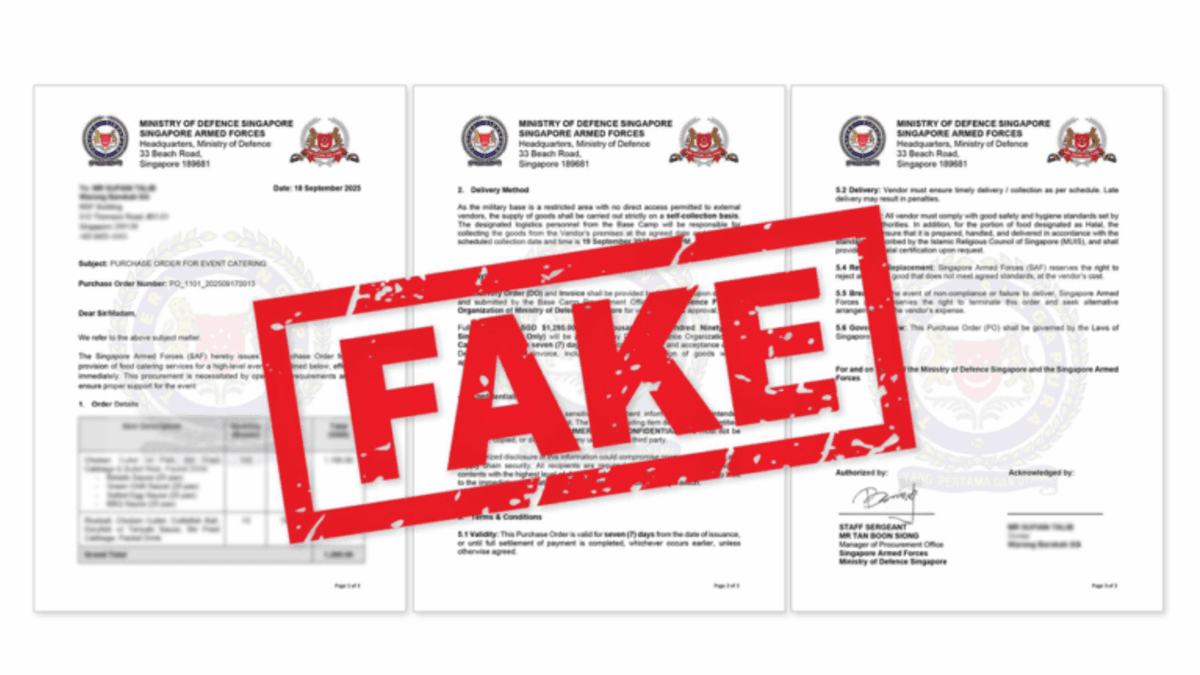MINDEF warns public after three new cases of forged bulk orders impersonating ministry detected
The Ministry of Defence (MINDEF) has warned businesses to stay alert after uncovering three new scam cases involving forged procurement documents impersonating the ministry and the Singapore Armed Forces (SAF).

- MINDEF detected three new scam cases involving forged procurement documents on 23 September 2025.
- Scammers impersonated MINDEF and SAF to place fraudulent bulk orders with local businesses.
- Authorities have arrested several suspects linked to earlier impersonation scams this year.
The Ministry of Defence (MINDEF) has issued a renewed warning following the detection of three new fraud cases involving fake procurement documents used to impersonate the ministry and the Singapore Armed Forces (SAF).
According to a statement posted on MINDEF’s official Facebook page on 23 September 2025, the scams involved perpetrators who used forged purchase orders bearing the ministry’s name and logo to contact suppliers. A screenshot of one of the fraudulent documents, spanning three pages, was also released to the public.
“We urge the public and all businesses to stay vigilant and report any suspicious activities to the police,” MINDEF stated. The ministry emphasised that genuine orders from MINDEF and the SAF would always come through official government channels and verified representatives.
These latest incidents differ from previous scams, which relied mainly on unsolicited phone calls or text messages rather than forged paperwork. In this wave, scammers sought to create a sense of legitimacy by presenting fake documentation that appeared professionally formatted and carried official-looking signatures.
The discovery comes amid a rising number of scams targeting local businesses in recent months. Scammers have been posing as SAF or government personnel to place large orders for food and other goods, many of which turned out to be hoaxes once businesses had already prepared or delivered items.
In one notable case earlier this year, a hawker stall prepared 150 packets of chicken and mutton briyani for what appeared to be a large SAF event, only to find the order was fabricated. Other victims included a bakery and a florist, who were similarly deceived into fulfilling large catering and supply requests.
The Singapore Police Force (SPF) confirmed that investigations into the impersonation scams have led to multiple arrests. As of 19 September 2025, six individuals had been apprehended for their alleged involvement in such cases. Among them, a 22-year-old woman has been formally charged in court, while others are assisting with ongoing investigations.
Preliminary findings suggest that several of the suspects may have acted under the direction of a larger scam syndicate operating through messaging platforms. Authorities believe the group coordinated fraudulent orders using stolen or fabricated identification materials to appear credible to vendors.
The scams typically begin with a message or email purportedly from a defence or educational institution, requesting urgent quotations or large orders for upcoming events. After vendors confirm availability, scammers may send fake procurement documents or promise official payment once goods are delivered. When the deliveries are made, however, the perpetrators disappear, leaving businesses with losses.
In a separate but similar scheme, three other companies — including a fruit vendor and a bedding supplier — were recently targeted by scammers impersonating staff from Singapore Chinese Girls’ School. Those cases, though unrelated to the MINDEF impersonations, followed the same pattern of fraudulent bulk orders and sudden disappearance before payment.
Authorities have urged businesses to verify all procurement communications through official channels before proceeding with large or unusual requests. Genuine government procurement correspondence will come from verified government email domains ending in “.gov.sg” and not through personal or third-party messaging applications.
Businesses are also advised to cross-check with relevant ministries or organisations through publicly listed contact numbers before preparing any goods or services.
The Singapore Police Force and MINDEF continue to work together to track the source of the recent forgeries and identify any links between the latest batch of forged documents and previous scam operations. Police investigations are ongoing, and members of the public with information are encouraged to file reports through the SPF’s online portal or contact the Anti-Scam Helpline.
The authorities have further advised that any suspicious procurement emails or orders referencing MINDEF or the SAF should be reported immediately. The ministry reiterated that it does not issue bulk purchase requests via WhatsApp or unauthorised intermediaries and that all procurement transactions are managed under strict verification procedures.
This latest advisory is part of a wider national effort to curb scams involving impersonation of government agencies. According to the police, impersonation and phishing scams remain among the top reported offences in Singapore, with increasing sophistication observed in documentation and communication tactics.
Cybersecurity experts have noted that scammers are increasingly using artificial intelligence tools to produce convincing fake paperwork and digital signatures, heightening the risk of businesses falling victim to fraudulent transactions.
MINDEF concluded its public statement by reaffirming its commitment to transparency and cooperation with affected businesses. It encouraged victims to come forward without hesitation to help the authorities gather evidence against the syndicates involved.
The ministry also stated that further measures, including awareness campaigns and workshops for frequent government vendors, may be implemented to strengthen verification practices within the supply chain.
As the investigation continues, both MINDEF and the police are reminding companies and individuals to remain cautious when responding to unsolicited messages, particularly those requesting urgent deliveries or advance payments.







